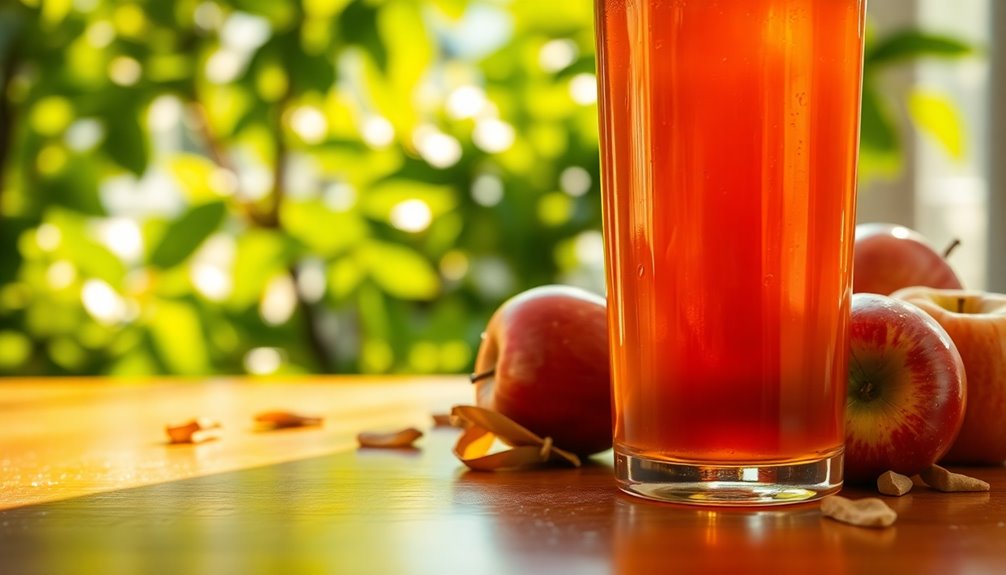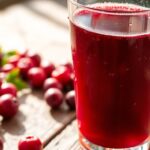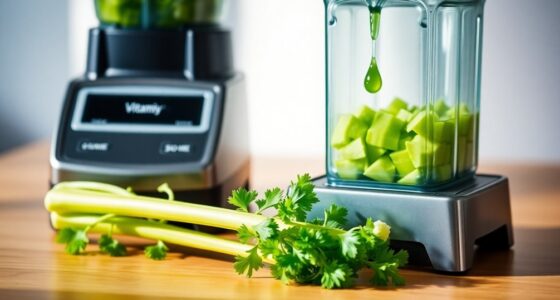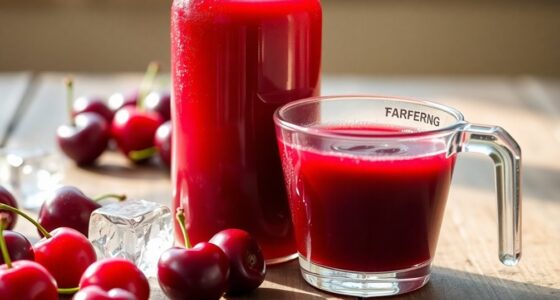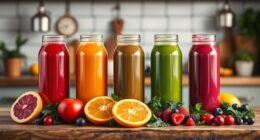Apple juice typically contains about 200 to 250 mg of potassium per cup, providing roughly 4 to 5 percent of your daily recommended intake. While it’s a decent source, it won’t cover all your potassium needs. Keep in mind that processing methods can affect the potassium content, and some brands may even fortify their juice. If you want to explore how apple juice fits into your diet and its other benefits, there’s more to discover. Additionally, apple juice can be a refreshing addition to your daily intake of fruits and vitamins. However, if you’re looking for alternatives, the potassium content in cranberry juice is notably different and can offer a unique taste along with its own set of health benefits. Remember that diversifying your juice choices can help ensure you’re meeting your nutritional needs effectively.
Key Takeaways
- Unsweetened apple juice contains approximately 200 to 250 mg of potassium per cup (240 ml).
- This potassium amount accounts for 4 to 5 percent of the daily recommended intake of 4,700 mg.
- Potassium content in apple juice can vary based on brand and processing methods.
- Cold-pressed and homemade apple juices generally retain more potassium and nutrients than store-bought varieties.
- Some commercial apple juices are fortified with additional potassium, so reading nutrition labels is important.
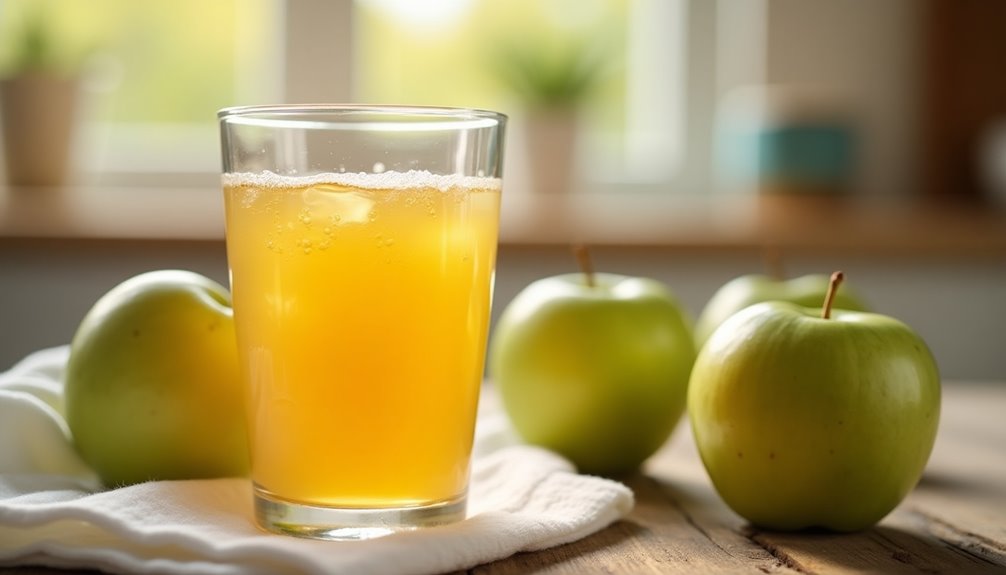
Have you ever wondered how much potassium is packed into a glass of apple juice? If you're looking to boost your potassium intake, you might be pleased to find that unsweetened apple juice typically contains between 200 and 250 mg of potassium per cup (240 ml). This amount represents about 4 to 5 percent of the daily recommended intake of 4,700 mg.
So, while a glass of apple juice won't cover all your potassium needs, it's certainly a good source to consider in your daily diet.
The potassium content in apple juice can vary quite a bit depending on how it's processed and the brand you choose. If you're opting for store-bought varieties, keep in mind that they often undergo pasteurization and complex processing, which might strip away some of the juice's natural nutrients.
On the other hand, homemade apple juice can yield different potassium levels, and cold-pressed varieties generally retain more of those beneficial nutrients. So, if you can, consider making your own juice or opting for cold-pressed options to get the most out of your drink.
When you check nutrition labels, you'll notice that some commercial brands even fortify their apple juice with added potassium. This can increase the potassium content, making it an even better option for those looking to enhance their intake.
However, it's essential to read the labels carefully, as not all apple juices are created equal. You might find that some brands focus more on flavor than nutritional value, so being informed about what you're drinking can help you make healthier choices.
In addition to its potassium content, apple juice is also a good source of vitamin C. This vitamin is vital for maintaining a healthy immune system and plays a crucial role in collagen production, which is important for skin and joint health.
Combining potassium and vitamin C in your diet can contribute to overall wellness, but remember that apple juice should be consumed as part of a diverse diet. Relying solely on juice for your nutrients won't provide the comprehensive nutritional balance you need.
While apple juice can offer some health benefits, it's crucial to incorporate a variety of fruits and vegetables into your meals. This way, you can ensure you're getting a wide range of vitamins, minerals, and other essential nutrients.
Frequently Asked Questions
Is Apple Juice High in Potassium?
You might wonder if apple juice is high in potassium.
It's considered a moderate source, providing around 200–250 mg per cup. That's about 4 to 5 percent of your daily recommended intake.
While it does contain potassium, it's not the richest source compared to other foods.
If you're looking to boost your potassium levels, make sure to include a variety of fruits and vegetables in your diet alongside apple juice.
What Juice Is Highest in Potassium?
When you're looking for juice with the highest potassium content, orange juice is your best bet. Fresh orange juice packs about 248 mg of potassium per ½ cup.
Whole milk outdoes many juices, offering even more at around 370 mg per cup.
If you want other options, consider grapefruit or pineapple juice, which also have notable potassium levels.
What Is the Best Drink to Lower Potassium?
When you're searching for a drink to lower your potassium, think of a refreshing cup of tea, warm and soothing.
With only 27 mg of potassium per 6 ounces, it's like a gentle breeze on a hot day. You might also reach for ginger ale or cranberry juice, both light options that keep potassium levels down.
Always check those nutrition labels, 'cause potassium content can dance around from brand to brand.
Stay refreshed!
Which Has More Potassium, Apple or Banana?
When you compare potassium content, bananas clearly come out on top. A medium banana packs about 422 mg of potassium, while a cup of apple juice only offers around 200–250 mg.
That means bananas provide over 75% more potassium than apple juice. If you're looking to boost your potassium intake, grabbing a banana is definitely your best bet.
Conclusion
In just one cup of apple juice, you're getting about 400 milligrams of potassium, which is roughly 10% of your daily needs. That's like munching on four medium bananas, blending the sweetness of apples with the boost your body craves. When you sip that refreshing juice, imagine all that potassium working to keep your heart healthy and muscles strong. So next time you pour a glass, remember it's not just delicious; it's a powerhouse of nutrients!
Cindy thoroughly researches juicing trends, techniques, and recipes to provide readers with practical advice and inspiration. Her writing style is accessible, engaging, and designed to make complex concepts easy to understand. Cindy’s dedication to promoting the advantages of juicing shines through her work, empowering readers to make positive changes in their lives through the simple act of juicing.

